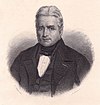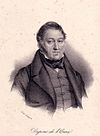| This article relies largely or entirely on a single source. Relevant discussion may be found on the talk page. Please help improve this article by introducing citations to additional sources. Find sources: "Jacques-Charles Dupont de l'Eure" – news · newspapers · books · scholar · JSTOR (February 2012) |
| Jacques-Charles Dupont de l'Eure | |
|---|---|
 Portrait by Ary Scheffer Portrait by Ary Scheffer | |
| President of the Provisional Government | |
| In office 26 February 1848 – 9 May 1848 | |
| Preceded by | Louis Philippe II (as King of the French) François Guizot (as Prime Minister of France) |
| Succeeded by | François Arago (as President of the Executive Commission) |
| Personal details | |
| Born | 27 February 1767 Le Neubourg, Kingdom of France |
| Died | 3 March 1855(1855-03-03) (aged 88) Rouge-Perriers, French Empire |
| Political party | Moderate Republicans |
Jacques-Charles Dupont de l'Eure (French: [ʒak ʃaʁl dypɔ̃ də lœʁ]; 27 February 1767 – 3 March 1855) was a French lawyer and statesman.
He is best known as the first head of state of the Second Republic, after the collapse of the July Monarchy as a result of the French Revolution of 1848.
Biography
Early career
Born in Le Neubourg, Normandy, he was a lawyer at the parlement of Normandy when the French Revolution began. During the First Republic and the First Empire, he filled successive judicial offices at Louviers, Rouen and Évreux. He had adopted revolutionary principles, and in 1798 began his political life as a member of the French Directory's Council of Five Hundred.
In 1813 he became a member of the Corps législatif and, during the Hundred Days, was vice-president of the chamber of deputies. When the Seventh Coalition armies entered Paris, he drew up the declaration asserting the necessity of maintaining the principles of government that had been established at the Revolution. He was chosen as one of the commissioners to negotiate with the Coalition sovereigns.
Prominence
From 1817 until 1849 (through the Bourbon Restoration and the July Monarchy) he was, without interruption, a member of the chamber of deputies, and he acted consistently with the Liberal opposition, of which he was the virtual leader. For a few months in 1830 he held office as Minister of Justice, but, finding himself out of harmony with his colleagues, resigned before the end of the year and resumed his place in the opposition.
Second Republic
When the 1848 Revolution began, Dupont de l'Eure was made President of the provisional assembly, being its oldest member. On the same day, he was made President of the Provisional Government, becoming France's de facto Head of State. He can therefore be considered as France's first Presidential Head of State, though Louis-Napoléon Bonaparte, later in the same year, was the first to formally bear the title of President of the French Republic. His prestige and popularity prevented the heterogeneous republican coalition from having to immediately agree upon a common leader. Due to his great age (upon entering office, he was just a few days short of his 81st birthday), Dupont de l'Eure effectively delegated part of his duties to Minister of Foreign Affairs Alphonse de Lamartine. On 4 May, he resigned in order to make way for the Executive Commission, which he declined to join. He supported Louis-Eugène Cavaignac against Louis-Napoléon Bonaparte. In 1849, having failed to secure his re-election to the chamber, he retired from public life.
His consistency in defending the cause of constitutional liberalism throughout the many changes of his times gained him the respect of many of his countrymen, who referred to Dupont de l'Eure as "Aristides of the French tribune".
References
- ^
 One or more of the preceding sentences incorporates text from a publication now in the public domain: Chisholm, Hugh, ed. (1911). "Dupont de l'Eure, Jacques Charles". Encyclopædia Britannica. Vol. 8 (11th ed.). Cambridge University Press. p. 688.
One or more of the preceding sentences incorporates text from a publication now in the public domain: Chisholm, Hugh, ed. (1911). "Dupont de l'Eure, Jacques Charles". Encyclopædia Britannica. Vol. 8 (11th ed.). Cambridge University Press. p. 688.
| Political offices | ||
|---|---|---|
| Preceded byJean de Chantelauze | Minister of Justice 31 July 1830 – 27 December 1830 |
Succeeded byJoseph Merilhou |
| Preceded byLouis-Philippe King of the French |
De Facto Head of State of France 24 February 1848 – 6 May 1848 |
Succeeded byExecutive Commission |
| Chairman of the Provisional Government of the French Republic 24 February 1848 – 6 May 1848 | ||
| Presidents of France | |
|---|---|
| Second Republic (1848–1852) | |
| Third Republic (1870–1940) |
|
| Fourth Republic (1947–1958) | |
| Fifth Republic (1958–present) |
|
| Acting presidents are denoted by italics. | |
| Paris Municipal Commission Ministry of 1830 (31 July 1830 to 1 August 1830) | ||
|---|---|---|
| Commissioners |  | |
| Justice | Jacques-Charles Dupont de l'Eure | |
| Finance | Joseph Dominique, baron Louis | |
| Navy | Henri de Rigny | |
| Foreign Affairs | Louis Pierre Édouard, Baron Bignon | |
| Public Education | François Guizot | |
| Interior and Public Works | Casimir Pierre Périer | |
| War | Étienne Maurice Gérard | |
| Preceded by: Ministry of Casimir de Rochechouart de Mortemart − Followed by French Provisional Ministry of 1830 | ||
| French Provisional Ministry of 1830 (1 August 1830 to 11 August 1830) | ||
|---|---|---|
| Interior | François Guizot |  |
| Justice | Jacques-Charles Dupont de l'Eure | |
| Foreign Affairs | Jean-Baptiste Jourdan | |
| War | Étienne Maurice Gérard | |
| Finance | Joseph Dominique, baron Louis | |
| Navy | Henri de Rigny | |
| Public Education | Louis Pierre Édouard, Baron Bignon | |
| First ministry of Louis-Philippe (11 August 1830 to 2 November 1830) | ||
|---|---|---|
| Head of state: King Louis Philippe I | ||
| Interior | François Guizot |  |
| Justice | Jacques-Charles Dupont de l'Eure | |
| Foreign Affairs | Louis-Mathieu Molé | |
| War | Étienne Maurice Gérard | |
| Finance | Joseph Dominique, baron Louis | |
| Navy and Colonies | Horace François Sébastiani | |
| Public Education, Religious Affairs | Victor de Broglie | |
| Ministers without portfolio | ||
| Cabinet of Jacques Laffitte (2 November 1830 to 13 March 1831) | ||
|---|---|---|
| Head of state: King Louis Philippe I | ||
| President of the ministry | Jacques Laffitte |   Jacques Laffitte |
| Interior |
| |
| Justice | ||
| Foreign Affairs | ||
| War | ||
| Finance |
| |
| Navy and Colonies | ||
| Public Education and Religious Affairs | ||
| French Provisional Government of 1848 (24 February 1848 to 9 May 1848) | ||
|---|---|---|
| President of the Council | Jacques-Charles Dupont de l'Eure |   Jacques-Charles Dupont de l'Eure |
| Interior | Alexandre Auguste Ledru-Rollin | |
| Foreign Affairs | Alphonse de Lamartine | |
| Finance |
| |
| Justice | Adolphe Crémieux | |
| Public Works | Pierre Marie de Saint-Georges | |
| Agriculture and Commerce | Eugène Bethmont | |
| Education and Religious Affairs | Hippolyte Carnot | |
| Navy and Colonies | François Arago, Sub-secretary Victor Schœlcher | |
| War | ||
| Other members | ||
- 1767 births
- 1855 deaths
- 19th-century heads of state of France
- People from Eure
- Knights of the First French Empire
- Politicians from Normandy
- Moderate Republicans (France)
- Heads of state of France
- Members of the Council of Five Hundred
- Members of the Corps législatif
- Members of the Chamber of Representatives (France)
- Members of the Chamber of Deputies of the Bourbon Restoration
- Members of the 1st Chamber of Deputies of the July Monarchy
- Members of the 2nd Chamber of Deputies of the July Monarchy
- Members of the 3rd Chamber of Deputies of the July Monarchy
- Members of the 4th Chamber of Deputies of the July Monarchy
- Members of the 5th Chamber of Deputies of the July Monarchy
- Members of the 6th Chamber of Deputies of the July Monarchy
- Members of the 7th Chamber of Deputies of the July Monarchy
- Members of the 1848 Constituent Assembly
- Peace commissioners of the French Provisional Government of 1815
- French people of the Revolutions of 1848
- Knights of the Legion of Honour
- Ministers of justice of France